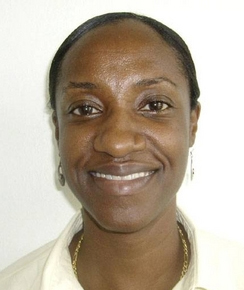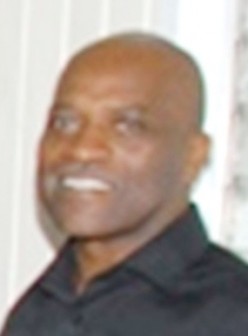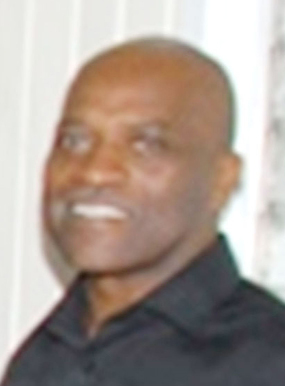-says public courts are a tremendous asset
Twelve-time Jamaican national squash champion Karen Anderson recently upgraded her coaching qualification by completing the Level II coaching certificate here in Guyana from national coach Carl Ince.
Anderson, who has coached Jamaica national team for the past six years, is also a member of the country’s national rifle shooting team and while in Guyana for those championships, she took the opportunity to upgrade her coaching certification.

The Central American and Caribbean Games mixed doubles bronze medallist said that she wanted a different perspective on squash, while gaining more technical information on how to teach the game. Anderson said that Ince and the local squash environment was ideal for what he was seeking and she was able to absorb a great deal of knowledge to impart back home in Jamaica.
“It was very very informative. I have to say I have learnt a lot and I can’t wait to put it into practice as soon as I get back home,” Anderson said.
Anderson told Stabroek Sport that she had obtained her Level I Certification from Canada Squash about six years ago, but it was very interesting to learn from Guyana’s level four elite coach Ince who provided a unique insight to coaching.
“Coach Ince has had so much success here and you can see it every year at the Caribbean level and I thought I would be interesting to learn from him…” Anderson said. Guyana has won the last eight consecutive titles of the Caribbean Junior Squash championships.
Some of the subject areas that the course covered included advanced tactics and technique, general safety, planning, lesson content, progressive method of the developing theme, communication, attitude and coaches’ code of conduct.
“There were some subtle but very crucial things that I picked up, subtle things like swing and court movement and so on but they make a huge difference…” Anderson added.
 Ince, who had also certified a Trinidadian coach about a year ago, said that he was very pleased with Anderson’s performance during the course.
Ince, who had also certified a Trinidadian coach about a year ago, said that he was very pleased with Anderson’s performance during the course.
Ince said that apart from her superior knowledge of the game, which could be attributed to the fact that she was former player, she possessed a positive attitude and worked well with children.
The 41-year old Anderson, who is also the vice president of the Jamaica Squash Association (JSA), worked with some of the youths at the Guyana Squash Association (GSA) After-School squash programme at the National Racquet Centre Woolford Avenue.
Anderson said that she was blown away with Guyana’s public courts after seeing it last year when Guyana hosted the Caribbean Area Squash Association (CASA) Junior Caribbean Championships. Anderson, who coaches close to 20 youngsters in Jamaica said that one of the biggest challenges to developing the sport in Jamaica in broadening the game.
“Most of players that we have are children of squash player so it’s a challenge to actually get numbers,” Anderson added. The 2006 Commonwealth Games plate runner up said that there approach was to try to implement the game at the school level but that is a great challenge since all the facilities in Jamaica where squash is played, are private clubs and not close to schools.
With that in mind, Anderson thought that the public courts provided an amazing opportunity for the further progression of the sport in Guyana, not just because they are public but because they are so many schools in the vicinity. Although the After School programme only began a few months ago, Anderson said that she could have already notice promising youngsters with the potential to make the national junior team.
Anderson said the courts are a great asset and should be utilised fully as it puts Guyana a step above the rest of the Caribbean as far as public facilities are concerned.






